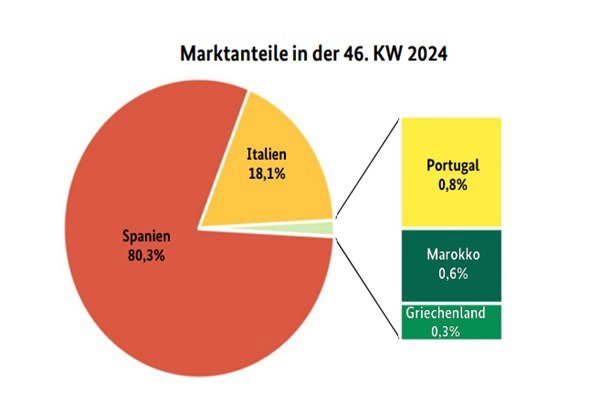Clementines predominated and came primarily from Spain. Availability had increased noticeably. The presence of Italian batches also visibly increased. Portugal, Greece and Morocco also marketed small quantities. According to the BLE, business was uneven: in some places, Spanish deliveries were somewhat scarce, which led to high quotations that then slowed demand. In some places, however, traders also had to offer discounts because the fruit did not consistently convince in terms of organoleptic properties or because interest was too weak.

Satsumas came mainly from Turkey and to a lesser extent from Spain: Demand was easily covered, with a slight upward trend in prices. Imports of mandarins from Peru and South Africa dominated. Peruvian exports were comparatively more strongly represented than in previous years, while South African exports are ending the season with significantly smaller volumes. Turkish unloading increased. Quotations developed unevenly, with availability playing a decisive role in most cases.
Apples
As usual at this time of year, German batches continued to dominate. Elstar, Boskoop, Tenroy and Jonagold formed the basis of the offer. Braeburn, Pinova and Wellant apparently gained in relevance. As a result of increased availability, some traders had to adjust their offers slightly downwards.
Pears
Italian lots dominated, followed by Turkish and Dutch. Significant quantities were also available domestically. Products from Belgium and Spain, on the other hand, were only of supplementary character. In Frankfurt, small-fruited varieties were popular, intended for kindergartens and hospitals.
Table grapes
Italian offers were noticeably predominant, but their overall presence was more limited. In some cases, the shortage of offers was quite severe, causing quotations to move upwards, in some cases quite significantly. The gap that arose could only be marginally filled by imports from overseas.
Oranges
Spanish fruit predominated, with various navel varieties available. In terms of organoleptic properties, the products were not entirely convincing. So prices were definitely trending downwards. On the other hand, not all caliber sizes were fully available and sometimes the availability of the Spanish batches was also limited.
Lemons
Spanish deliveries dominated the scene and gained noticeably in influence. Their quality was generally convincing, but defective specimens were also found on various occasions. Berlin reported real clearance prices, as the Spanish fruit often showed signs of poor condition.
Bananas
Supply and demand were in reasonable balance. In some places, the fall weather had slightly improved the possibilities for storage. However, this had little effect on quotations, which generally remained at the level of the previous week.
Cauliflowers
Domestic, Belgian and Italian batches formed the basis of the supply, although the end of the domestic campaign is already in sight. Deliveries from France increased. In addition, some Spanish and Dutch batches were still involved in commercialization.
Salads
The presence of Spanish offers of iceberg lettuce had increased, which in some cases led to gradually falling quotations. Lettuce came primarily from Germany and Belgium, with Italian and early French batches completing the supply.
Cucumbers
The assortment of cucumbers changed: Spanish products now dominated. The presence of Dutch and Belgian offers apparently diminished; their season is nearing its end. Domestic batches ended the season. The quotations mostly trended downward.
Tomatoes
The Belgian and Dutch inflows decreased a little, and Turkish imports also slowed slightly. In contrast, Moroccan and Spanish shipments gained in importance. Italian offers also played a slightly larger role than before.
Sweet peppers
Overall, the Spanish lots prevailed, but Dutch and Turkish products still played an important role. Belgian batches were of a rather supplementary nature and domestic articles were also rarely found.
Source: BLE
